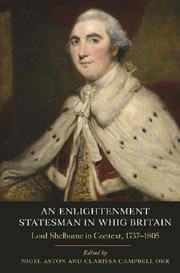Book contents
- Frontmatter
- Contents
- List of Illustrations
- List of Contributors
- Acknowledgements
- List of Abbreviations
- Introduction
- Part One Family, Piety, and Finance
- Part Two Politics
- Part Three The Bowood Circle Revisited
- 9 ‘Opening the Door to Truth and Liberty’: Bowood's French Connection
- 10 Lord Shelburne's Constitutional Views in 1782–3
- 11 Jeremy Bentham at Bowood
- 12 Shelburne and Perpetual Peace: Small States, Commerce, and International Relations within the Bowood Circle
- Index
- STUDIES IN EARLY MODERN CULTURAL, POLITICAL AND SOCIAL HISTORY
9 - ‘Opening the Door to Truth and Liberty’: Bowood's French Connection
from Part Three - The Bowood Circle Revisited
Published online by Cambridge University Press: 05 September 2013
- Frontmatter
- Contents
- List of Illustrations
- List of Contributors
- Acknowledgements
- List of Abbreviations
- Introduction
- Part One Family, Piety, and Finance
- Part Two Politics
- Part Three The Bowood Circle Revisited
- 9 ‘Opening the Door to Truth and Liberty’: Bowood's French Connection
- 10 Lord Shelburne's Constitutional Views in 1782–3
- 11 Jeremy Bentham at Bowood
- 12 Shelburne and Perpetual Peace: Small States, Commerce, and International Relations within the Bowood Circle
- Index
- STUDIES IN EARLY MODERN CULTURAL, POLITICAL AND SOCIAL HISTORY
Summary
When Lord Shelburne underwent his ‘conversion’ to France, he did so with unfettered enthusiasm. As Derek Jarrett suggested, Englishmen encountering Paris and Parisians in the eighteenth century tended either to be excited or irritated by their experience. After his character-reforming visit of 1771, ‘Shelburne was one of the excited ones; and the importance of his excitement lay in the fact that most of those upon whom the traditional patriot movement had been built were among the irritated ones.’ Throughout the eighteenth century Paris and London vied with each other to be acknowledged the first cities of Europe, much as France and Britain competed for supremacy, whether on the field of battle or in the realms of artistic patronage and the development of imperial trading monopolies. Fear and suspicion of the continent was seen by many Englishmen, then, as something to be cultivated as a way of improving their patriotic credentials. In an oration preached to the lord mayor of London in 1713 on the death of Henry Compton, the notorious warrior-bishop of London, Thomas Gooch (later himself raised to the episcopate, first as bishop of Bristol) asserted that Compton's own foreign travels had served to underpin his sense of national identity: ‘He observ'd and examin'd the Civil and Ecclesiastical Polities abroad; he made them his Study but not his rule. The more he stayed in France and Italy the more English-Man he was.’
- Type
- Chapter
- Information
- An Enlightenment Statesman in Whig BritainLord Shelburne in Context, 1737–1805, pp. 197 - 214Publisher: Boydell & BrewerPrint publication year: 2011

